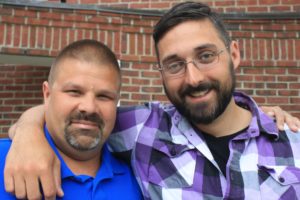 “Organ donation saved my brother’s life twice,” says Ryan Ashcraft, the younger, more talkative brother.
“Organ donation saved my brother’s life twice,” says Ryan Ashcraft, the younger, more talkative brother.
Bearl Ashcraft nods and describes the experience that led to his first surgery, a heart transplant in 2001. “I had no idea that I had heart problems. I had stomach pains. Stomach pains.” He shrugs and shakes his head. “It seems crazy, but that’s it. I had stomach pains and passed out at work. They took me to Clark Regional, where the doctors did a scope. They nearly lost me on the table. That’s when they sent me on to Saint Joe.”
“When they told me I needed a heart transplant, I was in shock.”
“The whole family was in shock.” Ryan slips in. “Bearl had some kind of viral infection that made its way to his heart and caused him to have cardiomyopathy. He was in his early twenties. He wasn’t supposed to have heart disease.”
Bearl takes over for a while. “My heart was pumping about thirty percent at the most, and they implanted a defibrillator. It worked like the paddles, only it was smaller and internal. It would sense my heart stopping and shock it to restart. They also told me that I would need a heart transplant, but that I’d have to lose weight first.”
“Yeah, he was over three-hundred pounds. He had to lose about one-hundred pounds before they would do the surgery,” adds Ryan. “Eventually they had to put him on an LVAD, too. It’s a pump that’s attached to the heart to help it pump. We had to change the batteries during the day exactly every four hours on the dot. There were some times we cut it close.”
Bearl places his hands over his heart. “The pump was here,” he says. “And we could plug it in overnight so we didn’t have to worry about the batteries while we slept.” He shows how the harness fit over his shoulders with batteries on either side of his torso and the controller lies near the right hip with wires connecting it to both the batteries and the pump.
“The LVAD wasn’t planned. I’d gone in to Jewish to get a heart cath and they lost me on the table. They had to rush me into the ICU. That’s when they did the LVAD.”
“It was a thirteen-month wait for a transplant,” explains Ryan, “And during all of this, he had a wife and a one-year-old at home.”
Bearl nods. “It was a long thirteen months.”
“A couple of times, we thought he was going to get a heart. One time, someone we knew died, and we thought it was really cool that Bearl might get the organs of someone we knew, but that didn’t work out. They couldn’t use the organs.”
“Then, one day, I was in the hospital with an infection. They had to put a pic line in and I was ready to go home. They didn’t want me to leave. The nurses said it was something about my insurance. I knew my insurance was fine, so I walked down to the transplant office to find out what was going on. There was a heart coming in. They didn’t know if they could use it or not, so they didn’t want to get my hopes up. They wanted to know it was good before they told me.”
“That was his heart.” Ryan jumps in. “They took him into surgery and we saw them wheel that little cooler in and knew that his heart was inside. It was pretty cool.”
Bearl begins, “The doctor came in the next day –“
“It wasn’t the next day.” Ryan laughs. “You were out for a week. He was in a medically induced coma for a week.”
“Well, it felt like the next day to me,” Bearl insists, “The doctor came in the next week and said, ‘You need to go play the lottery now that you have you a heart.’”
“Bearl’s surgeries were in Louisville, when they were doing the artificial hearts. Muhammad Ali was there to visit with the guys who had the artificial hearts, and he stopped in to visit Bearl, too.” Both brothers grin. Clearly, the Ali visit is a highlight.
“I spent two more weeks in the hospital after that. Then they sent me home. Most people, after they get a heart transplant, want to eat and sleep. I was the opposite,” explains Bearl. “I couldn’t sleep and I didn’t want to eat.”
“I dealt with a little rejection, just trying to get the meds all regulated. I went back to the doctor each week, then each month. Now it’s each year. At first, I was all swelled up with prednisone.”
“There was always something with the heart transplant, some little problem. An infection or something else. He was always in and out of the hospital,” Ryan stated. “One problem was the anti-rejection meds. They can weaken bones. Bearl’s had two hip replacements. The meds finally affected his kidneys, which is typical for heart transplant patients.”
That was in 2010, but it wasn’t until 2013 that the doctors told Bearl he would need a kidney transplant. “My creatinine levels were high, and they told me I’d need dialysis until the transplant.”
“At first it was like, ‘You need this in three years.’ Then, all of a sudden, it turned into, ‘You need this NOW!’” Ryan says. “As soon as we heard, the whole family wanted to be tested to be living donors. I talked to my wife about it. She supported my decision completely. I told the doctors that I was the youngest person in my family. I was in the best health of anyone in my family, and they should just test me until they had to rule me out. I didn’t want anyone else to be Bearl’s kidney donor if I could help it. I had to go through the psyche evaluations, all the same tests as the people getting transplants. I ended up being the only one tested.”
“A couple of days before, I got a little nervous, thinking about my wife, Lauren, and our kids, Avery and Caden, who were four and two at the time. Any parent has to worry, thinking about what would happen if something goes wrong, but I really wasn’t scared.”
“We had to get ready in separate rooms,” Bearl explained, “But they let us pass each other in the hall on my way in.”
Ryan laughs and shakes his head. “I came out of surgery with a pain so bad morphine couldn’t touch it and so swollen my wife couldn’t recognize me. She said I was screaming.”
Bearl chuckles. “My surgery was great. I felt absolutely fine.”
“Yeah.” Ryan shakes his head. “Dad came in to check on me and said that Bearl was down in his room drunk dialing people from the anesthesia. He was talking to people in Florida, and I was pretending that I was asleep when people came to visit so that they’d go away.”
Both brothers laugh. Bearl points to Ryan. “He had a lot of trouble. He went home and had to come back to the hospital. I was fine.” He’s rubbing it in, laughing. “I was calling friends in Florida.”
“The morning after the surgery I took my medicine and the doctors told me I could go home. So I did.” Ryan says. “Who wouldn’t? I went home within twenty-four hours of having major surgery. The drive between Louisville and Winchester was the worst drive ever. I got sick in the car. It was so bad my sister was waiting for me in the driveway with water when I got home because I was dehydrated. Then I couldn’t sleep that night. The next morning, I decided I was going to walk upstairs and take a shower. Well, in the shower, I pulled my pain block out, and that’s when I knew something bad was wrong. The rest of the evening I lay there on the couch in pain, until I started throwing up at nine that night. I didn’t stop until seven the next morning.”
“We called the team and they said to come in, or we could go local, which we tried. I spent ten hours waiting for an ambulance to take me from Winchester to Louisville. Then I spent another two days in the hospital.”
Bearl grins, “He ended up staying longer than I did.” He glances at his brother. “If it makes you feel any better, when I got home, I couldn’t sleep either. I had to go to the bathroom all night long. Every thirty minutes. But I had no problems. No rejection. Nothing. Heart and kidney have been good since then.”
“We sort of traded places,” said Ryan. “Suddenly I was the sick brother. For eight weeks I was sick all the time. I could barely stand up straight. I still have a weaker immune system. But I wouldn’t trade it. If I had to do it one-hundred times, I’d do it one-hundred times over. I wouldn’t want anyone else to be my brother’s kidney donor.”
“I haven’t met my heart donor’s family, but I have talked to his mother on the phone. He was a seventeen-year-old boy from Lexington who died of a brain aneurism and his mother told me he donated seven other perfect organs. He saved a lot of lives that day. We were going to meet, his parents and me, but it was just too emotional even talking on the phone. She told me that I was a part of her now, like a son to her.” You can feel the depth of emotion in Bearl’s words.
“You don’t think about it growing up. People need to sit down and think about becoming an organ donor. It’s hard, if you have someone dying in a hospital when people come in and ask. Why don’t people go ahead and register as organ donors so their families know what they want?” Bearl asks.
Ryan adds, “It’s not something that families talk about. You just do it without thinking. ‘Would you like to be an organ donor?’ ” He shrugs. “ ’Yeah, here’s your dollar.’ ”
“If someone’s unsure, I’d like them to think twice about it. It gives someone a second chance to live. It’s given me a second chance to live – twice.” Bearl grins.
Ryan’s chomping at the bit to say his final piece. “They’re not going with you, so why not save someone’s life if you can?”

